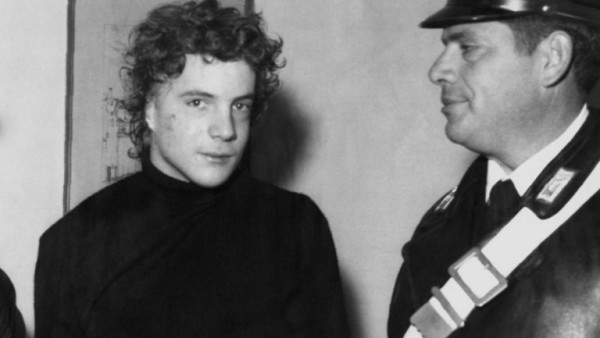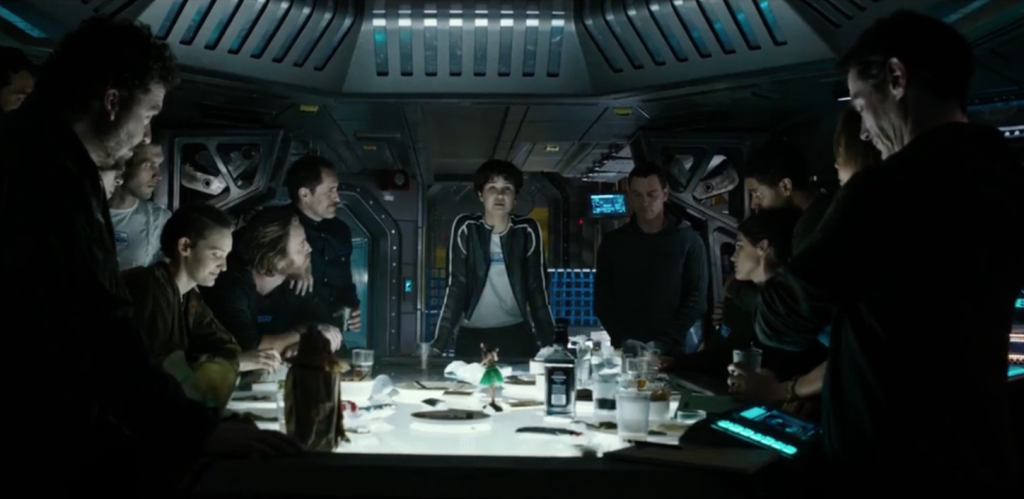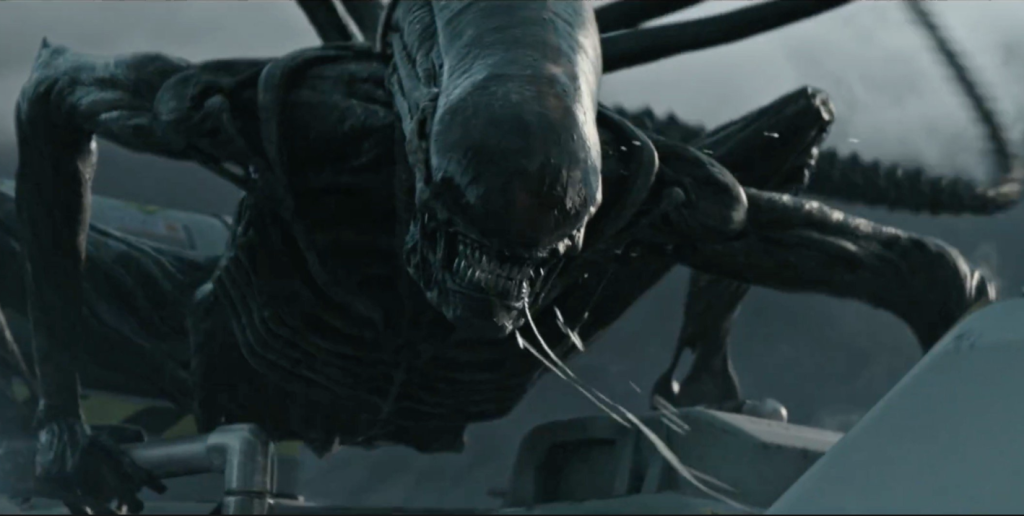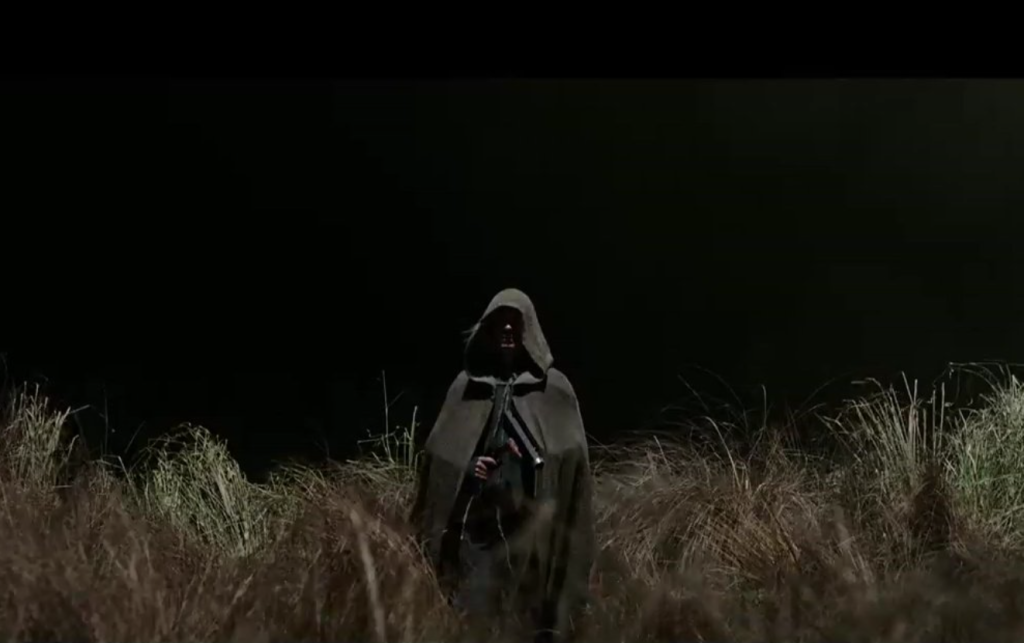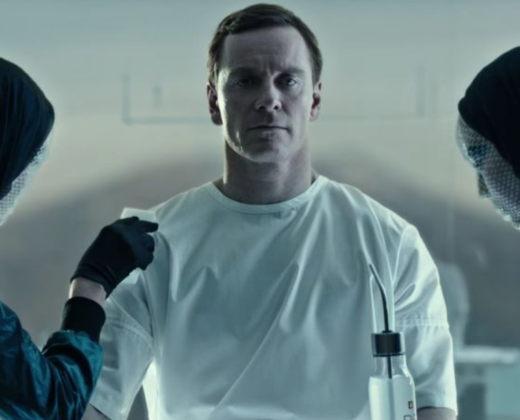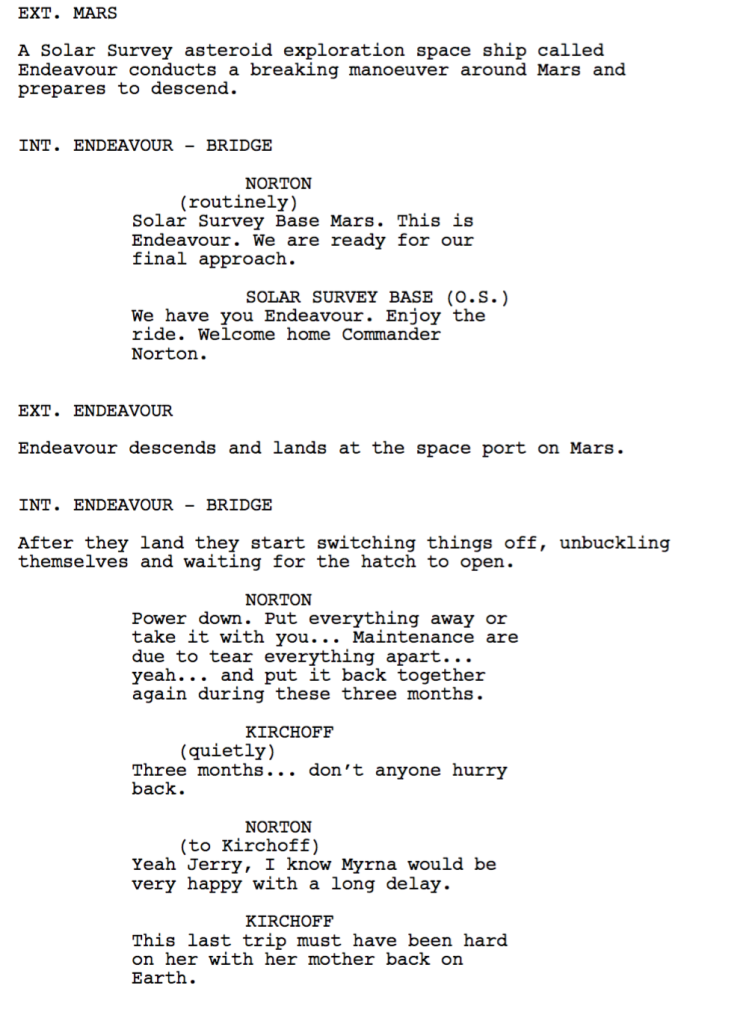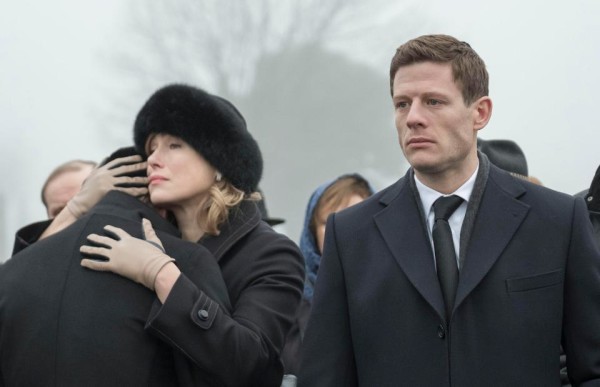Genre: Drama
Premise: The true story of the kidnapping of the richest man in the world’s grandson, and the subsequent refusal by John Paul Getty to pay the ransom.
About: If you got the feeling after Alien Covenant that Ridley Scott wasn’t interested in making an Alien movie, today’s project may be the reason why, as this film is set up to win Scott some Oscars. The “All The Money in the World” package just sold at Cannes, and will star Mark Wahlberg, Kevin Spacey, and Michelle Williams. The script is written by long-time scribe David Scarpa, whose most recent credit is The Day The Earth Stood Still (2008) and whose script for this film landed on the upper half of the 2015 Black List.
Writer: David Scarpa
Details: 120 pages
The most I knew about J. Paul Getty before today was that he built a museum in Los Angeles that’s a bitch to get up to.
So it was fun to learn all about the Citizen Kane’esque figure. Getty was the man who figured out how to get oil out of the Saudi Arabian desert. He negotiated rights to the land the oil was on, built the super tankers that would transport the oil to other countries, and built gas stations wherever those tankers would sail to.
You can imagine how much money someone would make owning the rights to oil the second it came out of the ground to the second it entered your gas tank.
Like most obscenely rich people, Getty was a quirky dude. He didn’t trust anybody, as he believed they were all after his money. And he was a notorious penny-pincher, going so far as to clean his own clothes at hotels, refusing to pay the dollar the hotel charged to do it.
J Paul Getty had lots of children (the man had 5 wives) so he didn’t have time to be close to all of them. One of his first sons, Paul, was discarded like a cheap sweatshirt, and grew up poor.
When Paul’s wife, Gail, got sick of living day to day, she demanded Paul get in touch with his father and ask for money. When Paul refused, Gail wrote the letter herself. Surprisingly, Getty welcomed them in with open arms, and the family went from Baltic Avenue to Park Place.
But the money went to Paul’s head, destroying his marriage with Gail, leaving Gail alone with their children, the oldest of whom was (also named) Paul. Gail settled down in Rome with the kids. Then one night, when teenage Paul was out partying, a group of men grabbed him off the street and kidnapped him.
They would later call Gail with what, they believed, was a bargain asking price. 17 million. The world went running to Getty. What was he going to do?? Getty shocked the media by stating simply, “I’m not paying it.” Instead, he hired a fixer, Fletcher Chace, to look into the kidnapping, then went back to operating his business.
Meanwhile, Gail was in a no-win situation. The kidnappers assumed she was rich, yet she barely had enough money for her own living expenses. When a police investigation uncovered information that Paul might have faked his kidnapping to con money out of his grandfather, everyone went their separate ways, assuming Paul would eventually come back home.
This led to Paul being stuck in his kidnapper’s lair for months, his mother the only one who believed he was in any danger. But her reach was so limited, that there was nothing she could do but wait. Wait to find out if her son would come home dead or alive.
All The Money In the World (a reference to Gail saying she couldn’t pay the ransom and the kidnapper replying, “Get it from your father-in-law. He has all the money in the world.”) starts out strong, with a clever first act that begins with the kidnapping.
This is followed by a flashback that explains who J. Paul Getty is, and how his estranged son, Paul, and Paul’s wife, Gail, came to work for him, which then led to their divorce, which then led to Gail raising the children on her own.
This section solidified the relationship between Gail and Paul, which was necessary since she’s the only person in the story who cares about his return.
However, the script stalls once Getty refuses to pay his son’s ransom since there’s nowhere left for the story to go. Nobody’s pursuing anything anymore. As a result, the majority of the second act amounts to people waiting around.
The only characters with active goals are the kidnappers. Their desire to get their money is the only thing left pushing the story along. And yet their scenes lack any notable drama, since they remain cordial with Paul all the way up to the final act.
The fixer, Chace, has the potential to be a cool character, but since Getty cuts his balls off, he’s relegated to being an emotional support system for Gail.
All of this leaves the story in a perpetual state of waiting. And, to be frank, it was difficult to care. We’re essentially watching a kidnap story where no one wants to save the victim. You know what it reminded me of? That weird Angelina Jolie movie, The Changeling? You know the one where you weren’t sure what you were supposed to be feeling or what was really going on? This story leaves you with that same type of feeling.
True life may be stranger than fiction, but it’s also less dramatic. Building a story around a kidnapping where no one goes after the victim is, literally, the most undramatic thing you can do.
The lone standout character in the script is Getty himself. And you can smell Spacey chomping at the bit to play a penny-pinching billionaire. He’s also one of the most dialogue-friendly characters you can write.
For newbies out there, the “professor” character is a great device to inject awesome dialogue into your story. “Professor” characters are characters who are always using history to make a point. These little stories not only add an element of suspense to each interaction, but a splash of fun as well.
For example, late in the script, Saudi Arabia ups the price of oil tenfold, making Getty ten times richer than he already was. Chace comes to him and says, surely you’ll pay the ransom now. Instead of saying, “I don’t have the money to spare at the moment,” Getty points out that he’s over-leveraged, offering, “Do you know how Jesse Livermore died? He was the greatest speculator in stocks ever to work on Wall Street. He blew his brains out in a coat check room after he lost every penny he had. That’s how fast a man’s fortune can turn. Don’t you see? I’ve never been more vulnerable financially than I am right now.”
So add a professor character if you want some cool dialogue.
Unfortunately, none of the other characters were as interesting as Getty. I couldn’t figure Chace out. He didn’t seem to be as good at his job as was advertised. Gail did look for ways to save her son, but you always felt like she could be doing more.
Then there was Paul. Clearly, Paul was a mess in real life. He did drugs. He partied all night. He hung out with sketchy people. I suspect this is the real reason nobody looked into Paul’s kidnapping. Because he was a deadbeat loser who brought it upon himself. But Paul’s sketchy lifestyle is never revealed to us, I suspect because, if it was, you wouldn’t have a movie. Since the concept is predicated on us sympathizing with Paul, we must erase all traces of Paul being a bad person. It all felt a bit manipulative.
There’s a movie in here somewhere. But I couldn’t find it in this draft.
[ ] What the hell did I just read?
[x] wasn’t for me
[ ] worth the read
[ ] impressive
[ ] genius
What I learned: Sandwich your boring parts. Any time you have a section filled with exposition or backstory, a smart move is to sandwich that section. For example, the first act here is backstory on the Gettys. Instead of immediately jumping into that section, Scarpa wisely SANDWICHES it between the kidnapping. We see the kidnapping right away, we then get the full backstory, then afterwards, we’re right back to the kidnapping.
Genre: Sci-Fi
Premise: A colonist ship follows a distress call to a nearby planet where a mysterious entity awaits them.
About: Alien Covenant is the… 6th film in the franchise? 7th? Ahh, who’s counting anymore. The film opened this weekend at #1 at the box office with 36 million alien bucks. It was scripted by “All You Need is Kill” writer Dante Harper and the man responsible for writing all the recent James Bond films, John Logan. Ridley Scott is back with the bullhorn. And Michael Fassbender has returned in clone-form, as he’s playing two parts in the film.
Writers: Dante Harper and John Logan (story by Jack Paglen and Michael Green)
I have a soft spot for the Alien franchise.
Aliens was one of those experiences that shaped my love of movies. And when something is wedged that deeply into your nostalgic subconscious, anything else you throw at me in the same universe I’m going to see it. And that, in a nutshell, is why the movie business is so successful. Once they get you on something, they can market that something to you for the rest of your life.
But the sad truth is, the Alien franchise has been terrible since Aliens. I don’t care what anybody says – Fincher’s Alien 3 was an embarrassment. Then there was that “Am I really seeing what I’m seeing??” Winona Ryder Alien 4 catastrophe. From there, they went from “We don’t know what we’re doing” to “We’ve officially given up,” dropping that Aliens vs. Predator abomination on us. It got ugly, folks. It got real ugly.
Then Ridley Scott returned to the franchise and, finally, it seemed like chest-bursting might be cool again. Indeed, Prometheus brought a lot of fun back to Alien. But it still came nowhere close to the quality of the first and second films. Then came a confusing array of events that, at one point, had District 9 director Neil Blomkamp helming a parallel Alien se-prequel that went back to Alien’s roots (bringing back the series’ star – Ripley) while Ridley Scott, who couldn’t care less about Alien for 40 years all of a sudden wanted to make four more Alien films.
WTF?
If there ever was a moment that symbolized the clumsy architecture of this franchise, that would be it. So it shouldn’t be surprising that Alien Covenant is just that – clumsy. What starts off as a pretty awesome flick turns into… well… I don’t even know what. But knowing screenwriting like I do, I’d distill it down to “writers who ran out of ideas.”
And look, I’m not ignorant here. I understand the studio priority ladder. It’s so hard to match up a director’s schedule with a star’s schedule with a studio’s schedule. So when those three worlds match? You pull the trigger no matter what state the script is in. You have to. Because if you don’t, the movie never gets made at all. And what good is a script if it never gets made into a movie?
It’s then up to big-name screenwriters to accomplish the impossible – construct a great original screenplay in the amount of time it usually takes you to finish an outline. Despite being hired to fail, these writers go into these projects with the best of intentions – hoping to pull off a miracle. Sadly, they rarely do. Which is why we get so many movies like Alien: Covenant.
For those of you who have no intention of seeing the film (and you shouldn’t) the plot starts out pretty basic. A colony ship 7 years from their destination receives a mysterious transmission from a nearby solar system and decide to go inspect it, partly because this planet never appeared on their colony research and they figure, hey, maybe we can cut 7 years off our journey and colonize this planet instead!
Once on the planet, they go looking for the signal location, and a couple of colonists sniff up alien dust. Within minutes, these colonists are sick, and when our infamous aliens burst out of their bodies, a mad scramble ensues on the landing ship, resulting in a catastrophic accident that blows the ship up.
Up until this point, I was onboard. But then things get weird. Like, really weird. While getting attacked by other aliens, a… a jedi [????] shows up, scares off the aliens somehow, and tells the colonists to follow him. Mysterious Jedi Dude (I call him this because he was wearing Obi-Wan Kenobi’s robe for some reason) brings us back to some giant spooky circle town that’s been long since abandoned, and when he takes off his hood, we realize it’s David, the psychopath robot from Prometheus.
Meanwhile, the colonists have their own robot, Walter, who’s an upgraded version of David. Walter immediately senses that David has gone off the deep end, but is still intrigued by him, to the tune of the two sharing a couple of sex scenes together. I’m not kidding. I mean, they don’t have sex, but they basically have sex. It’s too weird to explain and too dumb to recap so you’ll have to seek it out yourself to get the full dumbass experience.
Eventually we learn that David’s been breeding alien embryos and is excited to have some new humans to experiment on. So the killing begins, and this is where things get stupider and stupider, culminating in one of the oddest action scenes I’ve ever witnessed, where a woman who’s had three lines up until this point becomes the movie’s main action star, willingly jumping out on the side of an out-of-control ship to try and kill an alien.
There’s more – a sort of extra final act – but I’m not sure why they included it, since everybody already knew what was going to happen. It’s bad writing on about every level.
So let’s talk about how this movie fell apart, because I’m fascinated by how these things happen. For starters, there was no main character. While I’ve discussed the no-win situation you place yourself in when you don’t build your story around a hero, it’s not a script killer. In fact, the very first Alien didn’t have a main character either! Ripley didn’t emerge as the “hero” until the very end of that film.
But there’s a reason why that worked and this didn’t. The first film was CONTAINED. So it kept our focus laser tight on the situation at hand. The tight nature of that story allowed for a more fluid situation to emerge with the characters.
Alien Covenant was the opposite. It was all over the place. It was part contained horror, part ‘group explores a planet,’ part mystery, part philosophical drama. The film was trying to be so many things that messiness was already embedded into its DNA. Trying to pack more messy (identifying our main character on page 100) onto already messy made things feel, well, too messy.
To Alien Covenant’s credit, it was attempting to be more than your average summer blockbuster. It posed big questions about God and creation and why are we here. You have to give the writers credit for not throwing another by-the-numbers popcorn flick at us. But you only want to pose big questions if you have the time it requires to come up with answers. If you try to answer the biggest questions humanity has ever asked with 2 weeks left before production starts, you probably aren’t going to come up with satisfying answers.
At some point, the writers realized the answers weren’t coming, gave up, and started using screenwriter shock-tactic tricks (robots giving each other blowjobs) to deviate your focus from the fact that nothing in the story made sense.
One of the easiest ways to tell that a writer has run out of time (or doesn’t care) is when characters start acting illogically. Why would the Captain (Billy Crudup) willingly follow a robot that he knows is systematically killing his crew into a room full of gestating alien eggs? “Take a closer look,” David says as the Captain checks on an egg. “You can trust me.” And the Captain then takes a closer look. That really happens.
And there isn’t just one of these instances. They happen again and again.
The only reason I’m not giving this film a “What the hell did I just watch?” is because I loved the first 30 minutes. Otherwise, this movie is awful. Pulling in 36 million is 20% less than what Prometheus opened at. So I’m hoping that’s it for this franchise. And yet, like the aliens in the movie, these franchises never seem to die. They had the audacity, the other day, to announce another Terminator film after Terminator: Genisys.
[ ] What the hell did I just watch?
[x] wasn’t for me
[ ] worth the price of admission
[ ] impressive
[ ] genius
What I learned: You have to be willing to move off your original idea if it’s not working. I get the feeling that Scott went into this wanting to create a philosophical science-fiction piece that was bigger than aliens chasing people down corridors. That’s a noble pursuit. But good writers know that stories are living breathing things. Sometimes what you thought would work ends up not working at all, and a direction you’d never considered all of a sudden makes the story a lot better. Be malleable as a writer. In the end, it’s about finding the best story, even if that’s not the story you set out to write.
Anybody who lives on the West Coast, and especially people who live here in Southern California, know, that if you’re ever feeling down, if you’re ever feeling blue, there’s one place you can go that will always lift your spirits.
I’m talking about In and Out.
In and Out is a privately owned fast food franchise that separated itself from the competition by using a business model that is basically the opposite of McDonalds. “Make two things perfectly and they will come.” That’s right, In and Out only offers two things: burgers and fries. But they do it so damn well that you never want anything else.
In fact, the simplicity of the menu is what allows In and Out to be so yummy. Because they only make two things, they don’t have to freeze any of their food. They bring it in fresh every morning. That means every time you order a meal at In and Out, it’s guaranteed fresh.
But did you know that In and Out can also make you a great screenwriter?
I bet you didn’t. But read on, my friends. Because you’re about to have your mind blown and your taste buds satiated.
Every story you tell has two forces constantly at play.
The things coming IN.
And the things going OUT.
Let’s start with OUT since it’s the more familiar of the two. Whenever I talk about ACTIVE characters, I’m talking about characters who are goal-driven, who seek out objectives. Every time a character does this, they are pushing OUT onto the plot. Deadpool seeks revenge on his torturer. He’s pushing OUT on the plot. Michelle tries to escape the bunker in 10 Cloverfield Lane? She’s pushing OUT on the plot.
And this holds true for much smaller actions as well. If Michelle’s goal in a scene is to palm a knife during dinner she can later use against Howard, she’s pushing OUT onto the plot.
IN is, obviously, the opposite. This is when the plot throws things at your character. If a character is saving money to go to college (OUT) and a robber breaks in and steals all her money, that’s plot coming IN at your character. If a friend of hers is in an accident and needs to borrow a large portion of her savings, that’s plot coming IN. If the college calls and says they need the money now or they’ll have to give the spot up to someone else, that’s plot coming IN.
And that’s how storytelling works. Your hero is either pushing OUT on the plot or plot is sending things IN at the character. So why is this important? I’ll tell you why. Because one of the more common mistakes I see in screenwriting is screenwriters doing only one or the other.
For example, let’s say a screenwriter writes an OUT-dominated screenplay. A young female UFC fighter is trying to win the title. We could see her training (OUT), hire a coach (OUT), get a sponsorship (OUT), win all her warm-up fights (OUT), buy a bigger house (OUT). So let me ask you, does that sound like a compelling story? Of course not. We need some INS. We need her to bust up her dominant wrist in an accident (IN), her old crew turn against her (IN), her mom gets sick (IN), the heavyweight champion decide she doesn’t want to fight our protagonist (IN). The INs are what cause all the obstacles, all the conflict. Without INs, your story is a simplistic march to boredomville.
Consequently, scripts suck if they’re all IN and no OUT. If your character stays in all day, bored with the world, and then he gets an eviction notice because he hasn’t paid his rent (IN), then later his car gets towed (IN), then his ex-wife calls him for the first time in a year and says he owes her 10 grand in child support (IN) and then even if something good happens to him, like some random shop owner offers him a job (IN)… we’re going to get frustrated because our hero isn’t putting anything OUT into the story.
As you can probably guess by my tone, the best scripts have the IN and OUT in equal proportion.
One of the most powerful devices in a screenplay is to send your character off on an OUT and then, during the scene, hit them with an IN. So let’s say a Fortune 500 CEO is going out to accept a major award, an OUT scene. The audience then gets prepped for that to happen. That’s where their mind is. However, when our CEO is chatting with people before the award, a couple of men in dark suits come up, informing him that they’re from the SEC. They explain that they’re going to let our CEO accept his award so as not to embarrass him, but right afterwards, they’re going to arrest him for embezzlement. This is a total IN when we weren’t expecting one.
I’ve also discovered that if you are going to favor one over the other, INs get the nod, since INs are disruptors. They throw your hero off his path, force him to act, which is always when a character is most interesting.
But you want to use both aggressively. It’s an easy way to add more pop to a bland script. If something feels boring, add more INs and add more OUTs!
Now excuse me while I go order the Carson special: Two Double-Doubles and some Animal Style fries.
See you at the counter!
Edit: This draft going around is not the Scott Brick draft, but rather a chopped-up version of another writer’s draft of Rama (one of the risks of reviewing older scripts). Now we need to find the official Brick draft, as Coming Attractions says it is great.
Genre: Sci-Fi
Premise: When a giant mysterious cylindrical ship is spotted barreling through the solar system, a small team of astronauts goes to inspect it.
About: This project was a hot property for a few years in the early 2000s as both David Fincher and Morgan Freeman really wanted to make it. This was going to be Fincher’s make-up film for Alien 3. Unfortunately, it never came to be due to them never getting the script right. This is why good screenwriting is so important. A good script can thrust a project through a green light. A bad one can keep you at that stoplight that always stays red. And big directors only have so much patience before they blow the light and move on to the next big shiny thing. I still think this film will get made at some point. It’s too cool of a premise not to be. A lot of writers have tackled Rama. This draft was written by Scott Brick and is said to be one of the better offerings.
Writer: (edit) Philip Whitcroft (again, someone cut sections out of this script, so this isn’t the full representation of Whitcroft’s screenplay)
Details: 103 pages (2001 draft I think?)
I’ve known about this script for almost a decade now. The only reason I never read it was because I heard the book was good. So I wanted to read the book before I read the script. Well, I finally read the book!
And what a strange book it was. Rendezvous With Rama is a book with, maybe, the least amount of character development I’ve ever seen in a novel. Characters are only given cursory backstories and no meat whatsoever.
The reason, however, that Rendezvous with Rama is so revered is because it contains the most compelling mystery of any science-fiction novel ever. This is something I love to remind screenwriters about. Your script can be shit in one area as long as it’s really amazing in another. When Harry Met Sally has zero story. It’s just people talking for 2 hours. But it has the best romantic comedy dialogue ever.
Anyway, back to Rama. I never finished the book. Even though the mystery was, indeed, fascinating, the author had an excruciatingly annoying habit of describing the orientation of the characters. Since we’re inside a cylinder, he loved discussing whether the characters were not quite facing up, and not quite facing down either – TO THE TUNE OF 100+ TIMES! At a certain point, I was like, enough is enough, dude. This isn’t orientation porn. It’s a sci-fi novel. So I bailed.
Which is great news for me going into this script, as I can finally find out what happened! Let’s get into it…
It’s way way off in the future. We’re at the point where we have cities on each of the major planets in the solar system. Commander Norton is one of the best space pilots in the business, based out of Mars. Just as he returns from a routine mission, his science buddies hit him with a whopper of a discovery – there’s an alien ship shooting through the solar system, heading straight for the sun.
Due to the trajectory of this thing, humans will only have a brief window to inspect it. And the closest folks are Norton and his Mars team. So Norton’s team hops on their ship, the Endeavor, before shooting towards what the media is now calling, “Rama.” Unfortunately, they leave a little too fast, as ZOINKS, Norton’s 12 year old daughter, Myrna, was able to stow away on Endeavor, joining the mission!
The group gets to Rama and finds a giant streamlined sphere. There’s only a single blemish on the sphere, which they realize is a way in. So they land next to it and head inside. The hollow Rama goes on for hundreds of miles, so they can’t see it all, but it appears to have several giant cities inside.
However, when they get closer, they see that these aren’t cities at all, but rather giant featureless rectangles. This is commonplace on Rama. Everything has the appearance of life, and yet is completely dead. They see a giant sea, except when they get to it, it’s like one enormous piece of plastic. What the hell is going on??
The teams split into two to explore, and that’s when shit gets crazy. Rama begins to heat up, and as it heats up, things change. That plastic sea begins to melt into a real sea. Also, out of nowhere, various robotic entities the groups deem “biots” begin appearing. For example, spider biots skitter about, grabbing debris and disposing of it. It seems as if Rama is preparing for something. But what?
As our group gets closer to the answer, they realize they are in great danger. If they don’t get off of this ship soon, they’re going to be casualties of this Rama transformation. A good 100 miles away from the exit, that escape begins to look like a pipe dream.
Rendezvous with Rama was… frustrating.
I think I liked it. But I hated the first act so much that I’m not sure I can give it a passing grade. This was one of the shittiest first acts I’ve read in a long time. The writing was terrible, to the point where I thought I’d been duped and that this was a fan script. Luckily, the stuff on the ship (Rama’s mystery) redeemed the story. But only barely.
So why did I hate the first act so much? Let’s start with the first page:
Where the f*&% are the character introductions???? Are we just supposed to know who these people are telepathically? And does Norton have a first name? That’s a mystery ready for its own novel.
Things get worse when we meet Myrna, the commander with no name’s 12 year-old daughter. Myrna appears to be a character constructed just for this screenplay, a bad producer note likely suggested to expand the demographic. Because, oh yeah, a hard science-fiction movie about an alien invasion isn’t complete without a precocious 12 year old daughter who stows away on the ship. What is this? An episode of Star Wars: Rebels?
Anger reached a crescendo when the Hermians (the people who live on Mercury) threaten to blow up Rama with a nuclear bomb. That’s when I almost put the script down. However, once the script moved past those problems (thankfully, Myrna the Menace stays in the background for most of the story), it got good.
And it got good because Rama is awesome. The ship I mean. It’s just such a great mystery. What is this thing? What’s happening to it (why is it heating up)? What’s coming? If this is an alien race, what do they want? As each new mystery is introduced, I found myself thankfully forgetting more and more about the first act.
But if your script is only as good as its weakest link, this one needs an entirely new setup. For starters, the weight of finding an alien freaking space ship for the first time in history needs to be built up! We need to feel the importance of this moment so that we know how important it is to go and investigate Rama. The discovery of Rama in this screenplay is given as much focus as finding a dollar bill in the dryer. “Oh look! I found a dollar!”
From there, there seems to have been zero outlining. With a discovery this big, the first thing that would happen is a giant question and answer session with the media so humanity could find out what’s going on. Instead, that moment comes when our group is on the ship, almost at Rama, a clear sign of, “Oh yeah, I forgot to include this scene. I’ll just do it now.” It fed into to the laissez-faire approach in which the script was written and in which all the characters seemed to approach Rama.
I mean it’s only the biggest discovery of mankind.
The time period for this is also wrong. We’re staked a couple of hundred years in the future, to the point where we have cities on all the planets. That in itself is amazing achievement, which dilutes the amazingness of discovering an alien ship. This needs to be set as close to present day as possible.
Not to mention, get rid of this nerdy Mars nonsense. Not only is it not 1954 anymore, but we need to be able to feel the shock and awe from people that this ship has been discovered. We can’t do that if we’re camped out on Mars.
And finally, we need a writer who understands character. The characters here are so thin. I’ve already pointed out that the main character doesn’t even have a name! Late in the script (spoiler) a “major” character comes back to life. It’s supposed to be this huge moment but we’re like, “Uhh, I don’t even know you, dude.”
It’s frustrating because this is a movie that could be great. This is a movie that someone should make. But we need a screenwriter who knows how to write. That’s going to be the first step towards giving Rendezvous with Rama a rendezvous with reality.
[ ] What the hell did I just read?
[x] wasn’t for me
[ ] worth the read
[ ] impressive
[ ] genius
What I learned: NEVER. EVER. take character introductions for granted. Give us a good description. Have the character perform an action that defines them as soon as possible. Have them talk and say things that let us know what their personality is immediately. And start feeding in their backstory as soon as you can invisibly do so. If we don’t know your characters, your script is doomed.
Genre: TV Pilot – 1 hour drama
Premise: A Russian fund manager educated in the UK must deal with the fallout of his fund when rumors begin to swirl that he operates in dirty Russian money.
About: AMC’s doing this new thing where they partner with BBC One to deliver a show that plays in both countries. So far the collaboration has given us two strong shows: Humans and The Night Manager. This series is also scripted by one of my favorite screenwriters, Hossein Amini, who, as long-time readers know, wrote that kickass draft of Nicholas Windng Refn’s “Drive.” After that film, Refn started writing his own screenplays and… well, I think we can all agree how valuable good screenwriters are on projects.
Writer: Hossein Amini
Details: 60 pages
Let’s get the most important thing out of the way. They have to change this title. “McMafia” sounds like a new cheeseburger at McDonald’s. Cheese, pepperoni, olive oil, spaghetti noodles. And it so happens McDonald’s is, indeed, the inspiration for the title. A mobster wants to run his crime business like the biggest fast food chain in the world. What does that mean? Let’s ask the script… “What’s the difference between McDonald’s and Burger King?” one of the characters’ inquires. “What?” the other character asks. “There’s more of them.”
That’s great that they drew inspiration from that exchange, but nobody’s going to take a show seriously that’s called McMafia. Titles are a funny thing. While it’s rare that a title can kill a movie/show before its release, it happens. Look no further than, “Gigli.” We’ll leave the title changes up to the producers. In the meantime, let’s figure out if this latest AMC offering is any good.
30-something Alex Godman has lived a charm life. His extremely rich Russian family sent him to America and the UK to be educated, and he took to it so much that he now identifies as British, running a well-known hedge fund that’s allowed him to keep his distance from his family.
You see, Alex has always resented being Russian. It’s only led to others making fun of him, pitting him as an eternal outsider. With this fund, he’s finally independent, finally carved out his own niche in life.
Alex’s family’s history is complicated. His father, Dmitri, had to leave Russia after a fallout with Putin. And Alex’s uncle (Dmitri’s brother), Boris, followed him to the UK. Boris is a bit of a black sheep, and you get the sense that his business dealings are as legitimate as a Chinese iphone. So when Boris comes to Alex asking to invest some money in his fund, Alex delicately lets him down.
But then things change. Alex’s fund becomes plagued with rumors that it’s filled with dirty Russian money – a blatant lie as Alex has worked hard to make sure all his money is legitimate. But before he knows it, most of his investors are dropping out. In order to save the fund, you know what he has to do. He must go to Boris and ask about those investors of his.
Boris assures him that the money is legit. It comes from a wealthy Jewish man so it won’t go on the books as Russian money. Alex flies to Israel to meet the would-be investor who, unsurprisingly, is shadier than a lamp store. Alex knows he’s dancing with the devil, but what can he do? He needs to save his business.
(spoiler) Then, right after he decides the Israeli money isn’t worth it, Boris is killed, a present from the man who exiled Dmitri back in Russia. The implication is clear. Boris the little brother first. Dmitri (Alex’s father) is next. That is unless Alex can talk the nasty Russian mobsters out of it. But what does he have to offer them? Oh yeah. A hedge fund that can potentially hide large sums of money, just the sort of thing an international mobster might have need for.
We’ve got a clever setup here. The pitch is: The “international modern day” version of The Godfather. You’ve got your big mobsters trying to run their crime businesses and the outsider son who doesn’t want anything to do with crime getting pulled in anyway.
And, truth to be told, TV is a better format to tell Godfather-like stories. These stories are about the characters more than the plot. It’s more natural for storylines to be drawn out. There are always lots of characters as well, requiring more time to get to know all these people. So I can see why AMC jumped on this.
And the central plotline is good. The hero, Alex, who wants so badly to steer clear of crime, is faced with a crippling reality: To stay afloat, he must accept dirty money. That’s something I’ve talked about before. The best drama revolves around good people being forced to do bad things. If you’re struggling with finding a script idea, that setup is a great place to start.
The plot of the pilot is pretty good itself and utilizes a popular trick born from the feature format – a midpoint twist. (spoiler) Alex is trying to figure out who started the rumors that his company is using dirty Russian money. The midpoint twist rolls around and the culprit turns out to be… Boris! His uncle. Boris knew the only way Alex would accept his dirty money is if he was desperate. So he started the rumor of dirty Russian investments so that he could, ironically, get Alex to accept dirty Russian investments.
The plot point is a reminder that the best twists are personal. If the rumors had been started by a rival company, so what? The fact that they were started by a man Alex was able to trust is what ignites the story. That’s what gets us juiced up.
My only issue with the pilot was that it was a bit… high-brow. It feels like the kind of thing rich 60 year old well-educated men might watch on a flight from Dubai to New York. There isn’t a lot of accessibility here. That was the secret ingredient of The Godfather. Despite us not being a part of that world, we felt close to those characters. For whatever reason, these characters feel further away. Maybe it’s the international thing. The financial thing. I don’t know but something’s keeping me from really caring about these people.
With that said, the script is well-written and well-researched. I mean everything sounds so specific to this world. Take this quote late in the pilot, where a character is being offered caviar: “This is Iranian Beluga. Much better than the caviar from our country. Less pollution on their side of the Caspian.”
To the untrained eye, this is a throwaway line. Who cares? To people who know their shit, this is the kind of detail that transports readers into the writer’s world. Great writers are not going to use stock dialogue and stock details. They’re going to do research and tell the reader things they don’t know. That line could’ve easily been, “This is great caviar. You’re going to love it.” That’s the kind of thing you see in amateur scripts. Seeking out the specificities of your world is a key component of transporting readers into your universe.
To summarize: a solid pilot if a little dry. And a title that needs a whopper of a change.
[ ] What the hell did I just read?
[ ] wasn’t for me
[x] worth the read
[ ] impressive
[ ] genius
What I learned: Complicate your character relationships. Especially in television, where the character storylines are elongated. You need to sustain tension and conflict in those relationships for as long as possible. You achieve this by looking for ways to dirty up the relationships. For example, Alex is engaged to a woman with a rich father. Think about that for a moment. How could you use the father to complicate Alex’s relationship with his fiancee? Amini does this by having the father invest in Alex’s fund. When the fund starts to tank, the father is pissed and wants answers. This small detail makes Alex’s relationship with his fiancee a lot more more complicated.


